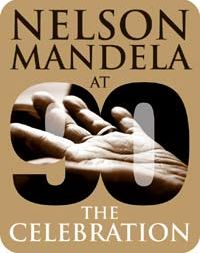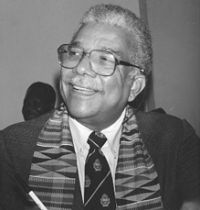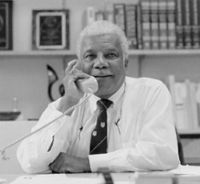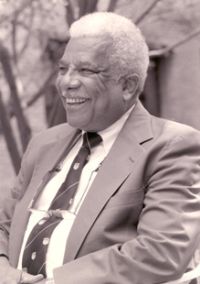
March 30, 2008 – In the second of our “In Conversation With” series to commemorate Nelson Mandela’s 90th birthday, Ali Mazrui talks with Tara Turkington about racial and religious intolerance, and current-day politics in the United States, Kenya, Zimbabwe and South Africa.
Tara Turkington: A few years ago, you were vilified for views on Israel and Palestine. What is your take on where we are with political and religious tolerance in the world at the moment?
Ali Mazrui: I think we still have substantial distance to cover before we achieve a truly open world in terms of points of view. You‘ve mentioned Israel and that‘s a striking example of one particular subject that is pretty risky to handle critically. As you know, I live in the United States part of my time, and I can criticise Uncle Sam with impunity within the United States, and yet within the same United States, it‘s risky for most people to criticise the state of Israel. I have known people whose tenure at universities has been compromised or cancelled because they express views sympathetic to the Palestinians. Israel is virtually the only country which enjoys impunity at the United Nations because anytime a resolution is proposed that is critical of Israel, the United States ensures that it does not pass. There is a sense that Israel enjoys greater impunity than the United States itself on the world scene.

So the United States is widely criticised, very often demonstrated against, attacked, abused, etc, but nevertheless it extends this remarkable protection to one of the more aggressive nations of the contemporary world. So that‘s a sad path, because Jews have been made casualties and victims of intolerance across the ages and now that they have a state of their own, instead of being a paragon of tolerance and compassion, they are occupying a people and treating them harshly.
With the world as a whole, there‘s a lot of optimism, right now, a lot of excitement here about Barack Obama. It is true, there are also indications that old prejudices are still alive and well, and the race issue is emerging. But just a few years ago, it would have been inconceivable that a black candidate would reach this far in his attempt to get a political party’s nomination for the presidency in this country, and that‘s a plus. I don‘t think we are there yet, and Obama may still be torpedoed by the race issue within the United States, but it‘s still been remarkable.
On religious tolerance, I think we’ve gone backward. This is my broad interpretation of what has happened: we have gained on issues connected with colour prejudice and race defined in terms of physical differences, but we are losing in matters of tolerance with regards to issues of cultural differences and religious differences. It is true that South Africa is a much better place now than it used to be before the 1990s from the point of view of issues of colour, and the United States is a more tolerant society than it was when I arrived here, more than a quarter of a century ago, strictly from the point of view of issues of colour. But the US at any rate, is definitely a less tolerant society about religious differences right now, and even Barack Obama, it’s no longer his colour that is attacked, it’s his middle name – Hussein – as if just having a Muslim name is a red rag to prejudices of culture. So we have lost some ground on issues of religious and culture toleration, but we’ve gained on the issues of race relations and tolerance in differences of colour.
TT: Why is that? How much of this has to do with issues of leadership and the way the United States has been led for the last decade or two? Why is it becoming less tolerant in terms of religion?
Ali Mazrui: Part of it is United States foreign policy and its consequences in its relationship with the Muslim world, part of it is the reaction of more radicalised Islam towards feeling under siege as a result of US foreign policy, and then things specific to the administration of George W Bush, which is one of the least enlightened regimes in the Western world since the end of World War II. So all these factors have created a climate which is far less accepting of differences in values than was the situation before.
In fairness to the United States, it was making progress even on issues of religious tolerance before September 11, 2001. Under President Clinton, we started recognising that this country is not just Judeo-Christian, but it has other religions. Under the Clinton administration, imams for US armed forces began to be appointed by the US army, because the US army has a lot of Muslims in its composition, who were previously neglected in their spiritual needs. During the days of Clinton’s administration, for example, I used to educate imams for the US armed forces in a particular Islamic school in Virginia. For the first time under Clinton, we used to receive messages from the president of the United States about the fast of Ramadaan, and wishing us a blessed fast, and Clinton received Muslims at the White House on Eid ul Fitr ... So there were signs the society was beginning to accept the presence of 6 million Muslims in the United States as part of the fabric of American society, rather than as an intrusion. Unfortunately, September 11 was a major blow to that trend, and so that part of it we must say is not entirely the fault of the United States, although it was unfortunate that we had a very unenlightened regime in terms of its response to such an aggression, and a regime that then added an unnecessary war, unconnected with September 11, and unleashed it upon Iraq. So we keep on hoping that these elections in the US would at least from the point of view of US foreign policy, result in new leadership, which may begin the process of mending American foreign policy and healing some of the wounds between civilisations.
TT: Now coming to Nelson Mandela in his 90th year, and you also hold a visiting professorship in Albert Luthuli’s name from a Nigerian university, these are men from South Africa who really stood up in the face of adversity and led people at extreme personal danger, and yet who are also known for their peacefulness. They’re people who fought peaceably, in a way. Do you think that the world can learn anything from people like this, at this sort of time? These are great African icons, but in this crazy, turbulent world, it’s easy to forget the past and just look to the future. Do you think that these people do offer something we can learn from as we go forward, into these very uncertain times?
Ali Mazrui: Absolutely. Nelson Mandela is one of the most extraordinary individuals in my own lifetime, and fortunately widely recognised by the world as extraordinary. So that’s a very important element in our situation. We haven’t had many such people in history. South Africa has a major burden on how to handle itself, having suffered so much under apartheid. That’s why people, when they look at Israel, say how could people who suffered so much not become a paragon of enlightenment once the state of Israel was created?
There’s a similar challenge with regard to South Africa – having suffered so much, is there a way in which South Africa can become a major moral leader in the world? You have not done too badly. Of course, you have your own problems and your own crusade of justice is not yet complete, and while it is true that political apartheid has been dismantled, there are major problems with regard to economic apartheid. As I have said many times before, it’s as if South Africans said to each other, the whites said to the blacks, “You take the crown, and we’ll keep the jewels ... Black people should assume the crown of political power, and white people should retain the jewels of economic prosperity.” So that side of it, you still have to resolve.
On the other hand, there are ways you are dealing with change that are impressive – the greater hesitation about taking life as a way of punishment. Unfortunately, the United States still exercises the death penalty, and many African countries do the same. And then, South Africa’s efforts to find ways of dealing with gay people so that they can have acceptance in society. These are major moral steps taken by South Africa in the very first decade and a half of the post-political apartheid era. So that’s a major plus, and that I regard as a major difference between Jews emerging from the Holocaust in Israel and becoming a repressive power in Israel, and South Africa emerging from apartheid and trying hard to become a beacon of hope. But your standards are fragile, and South Africa is still, in spite of industrialisation, an under-developed country, and therefore we have to watch it that you succeed in retaining this remarkable standing you have in world affairs.
TT: I think Franz Fanon said something like the oppressed will emulate their oppressors once they gain their freedom. In South Africa, there’s been a lot of debate about the fact that there are so few people who wear that crown and who have the jewels, and we haven’t really transformed as a society the way people like Nelson Mandela would have wanted us to.
I wanted to ask about your take on Kenya. What has happened in that country, that seemed to have so much going for it, and surprised the world when it erupted in violence?
Ali Mazrui: None of us expected that scale of reaction. In fact, when the parliamentary results were being announced, we were feeling very reassured, because one powerful Kenyan after another was losing his or her seat in Parliament. The Kibaki Cabinet of the previous government lost some 17 members in the elections, so it really appeared as if transparency had prevailed. Some of the most powerful of Kenyan politicians, including the vice-president at the time, lost their seats. All this on that remarkable day in late December. So the pinnacle of the election became the presidency, and what we thought was angry electorate throwing out the regime, suddenly seemed to spare the head of state. And that’s what seemed so incredible to many Kenyans, as well as to outside people: how could the ruling coalition have lost the people; how could the ruling coalition have lost so badly in parliamentary elections, and have prevailed at the presidential level? But as I say, none of us expected what would happen – we expected trouble, but not the collapse that did take place, which is the worst event which has hit Kenya since Independence. It may have been caused by a variety of factors which were awaiting resolution, including land grievances, poverty in areas, even in the middle of Nairobi, and then the eternal problem of ethnic rivalry and tribalism in Kenya.
In general, we were shocked, but we should also understand, why was it that it was working before? We need to take a step back, and ask why Kenya previously had a relatively stable existence, by our African standards. We had never had a military coup, we had experimented with a one-party state and dismantled it, we had had an election in 2002, when the ruling party, which had been in power since 1963, was thrown out – this was the Kenya African National Union (KANU) – at that time under President Daniel arap Moi. We tend to forget that it was thrown out of power, after more than 30 years, so that was remarkable in many ways. So we thought we were making good progress. We should try to recapture what was going well before, and still address what was imperfect, flawed, even in those years of relative stability. I hope we have the good sense to approach those issues as we attempt reconciliation.

TT: Do you ever go back to Kenya? Do you have the freedom to travel when you wish to at the moment?
Ali Mazrui: Yes, actually mainly because of [President Mai] Kibaki. They have never stopped me from just travelling, but until Kibaki, I used to be stopped from giving lectures, and most universities in Kenya would not touch me with a barge pole. Under President Moi, I was being invited all over the world to give lectures, including your great country, in South Africa, many times, but wasn’t allowed to lecture in my own country, in Kenya, until Kibaki was elected in 2002. He took steps which I never expected to restore me to a kind of national legitimacy. So I was invited to become chancellor of one of the state universities, Jomo Kenyatta University of Agriculture and Technology, and he awarded me a national honour first class, Commander of the Burning Spear. I was then able to give public lectures and was invited to Kenyan universities to give seminars. So I have every reason to be grateful to Mai Kibaki, as compared with the previous two presidents, Kenyatta and Moi, who were less friendly towards me.
But I was very, very disappointed at what happened in the elections this last December, and its aftermath, because I never expected the president to allow himself to be clearly influenced badly by a circle of loyalists around him. He could have avoided and spared the country this catastrophe, if he had made other choices.
TT: Professor Mazrui, as you know, Zimbabwe is gearing up for an election shortly. What is your take on what is happening in that country? In South Africa, there is a lot of criticism, fairly or unfairly, of our own government for not taking a stronger line with Zimbabwe. We see cartoons in the newspapers showing Thabo Mbeki’s quiet diplomacy and Robert Mugabe laughing behind his hand because he knows that he’ll never carry through on the promises he’s made Mbeki. So there’s criticism of Mbeki here in South Africa. What is your take on what is happening there?
Ali Mazrui: Well, I’m quite clear with regard to my opinion about what Mugabe should do – he really should just retire. He really spoilt what was a remarkable record of heroism, fighting for freedom, then to appear to cling on to power regardless afterwards. It’s very sad. I think he thinks history will vindicate him; I don’t think so. I think history will really criticise that he’s spoilt what was really a glorious service to Africa as a whole by clinging to power too long.
I’m more ambivalent about what South Africa should do. It is true that African countries should sooner or later take seriously this issue of peer review, and should attempt to influence each other when things go wrong either economically or politically, and that it is not a good idea just to wait until things collapse and then move in to deal with a failed state. So that side should make me say to Thabo Mbeki, come on, do something, don’t just wait there and then one day, when things are in total disarray, attempt a rescue operation. On the other hand, my hesitation is South Africa does have disproportionate power over its neighbours, and under previous, white-dominated regimes, that power was used to bully the neighbours. I’m very hesitant to recommend how far South Africa should go, even for a good cause, to use its power to bully Mugabe. I do think Thabo Mbeki could try harder with the carrot area rather than with the stick area, and could find ways of influencing Robert Mugabe with extending forms of welcome, with residence in South Africa, as well as in Zimbabwe, forms of honours that could be bestowed to him for previous services. In other words, the test is not simply towards using a big stick towards Mugabe, although quite frankly, there is a sense in which he does deserve it, if only we could do it without appearing to use South Africa’s bullying power on a small neighbour. The other choice is to find imaginative ways of using carrots, of making Mugabe feel that he is retiring in splendour, and easing out of power with dignity. I don’t know how it should be done, but we should struggle with ideas, sparing people’s dignity, even if they really don’t deserve it, and I don’t think Mugabe deserves it, we just need to do it for the sake of Zimbabwe and their future.
TT: This brings me to ask you what you think about South Africa. What is your perspective on our current leadership and what seems to be the future? It’s difficult to tell exactly what’s going to happen. The ANC did successfully change its leadership in December at Polokwane, but there are South Africans who are very uncomfortable with the prospect of Jacob Zuma being president. How do you see what’s happening in South Africa, as an “inside outsider”?
Ali Mazrui: You passed the test of succession within the party, but the electorate still has a choice. I can understand people are worried that the reputation of the strongest candidate for the head of state next time has been sullied by a number of scandals, but ultimately, we just have to see how the electorate will behave. It’s true that the electorate do not always vote for the most virtuous to take over, but that’s in the nature of democracy, and those who are against Zuma should make it clear what is wrong with him and see if that sticks. If it doesn’t stick, let us see how he performs. If the worst came to the worst and he’s performing badly, but the country is still free enough to impeach, then you can impeach while he’s still in office. In other words, I’d say, you passed the test of party succession, even if you don’t actually like the individual. Passing the test of who is the next head of state, it’s really up to the electorate, but the rest of the society should discuss the candidates frankly and openly and see what happens.

TT: What’s going to happen in the US? Who do you think is first of all going to take the Democratic candidacy, and then what’s the likely long-term outcome of the election – is it possible that we could have another Republican president?
Ali Mazrui: Yes, unfortunately, it is conceivable for [Republican presidential nominee John] McCain to win, partly because the Democrats are fighting each other dirty, and partly because the society may not be completely ready for a black president, though they are much nearer to it than they have ever been in history. But we still think it’s possible for Barack Obama to win the nomination of the Democratic Party, and most calculations are that he stands a better chance than Hillary [Clinton, the other frontrunner for the Democratic nomination], in spite of these recent setbacks with regards to his pastor, Jeremiah Wright, and his firebrand prophetic sermons. If he did win the nomination, the big question is will the Democratic Party rally behind him enough, and even if the hard core of the Democratic Party rallied enough, is the country ready to vote for a black president of the United States? So we’re on tenterhooks. I’d like to see it happen, not simply because Barack Obama and I both have a Kenyan father, but because I really do believe he would be a different type of American leader, not just because of his race, but because of his ideas, his style and his ambition to try and bring the country together. So we are praying hard, but nothing at the moment is certain.
McCain may be brought down in the end, seemingly, by his age. There is now more discussion about whether the country is ready to usher in for the first time someone who is over 70 years old, at the beginning of their career as president. Then a few lapses that McCain has made on his recent international trip, like confusing Shi’ite and Suni. These are being attributed to the type of mistake I would make, I’m also in my 70s, and we senior people sometimes lapse a little, so the media is already watching any errors he makes, and attributing them to his age. If this catches on, it may damage his electability, but at the moment he appears relatively strong.
TT: Professor Mazrui, thank you, it’s been fascinating talking to you, you have been both articulate and thought-provoking.
Ali Mazrui: Thank you very much indeed.
A shorter version of this article appeared in City Press on Sunday, 30 March 2008. The ideas and opinions expressed in this interview are not necessarily those of the Nelson Mandela Foundation.
About Ali Mazuri
Born in Mombasa, Kenya, in 1933, Professor Ali Mazrui is one of the world’s most distinguished scholars of Africa. He has authored more than 20 books and hundreds of essays, and is known for his sometimes controversial views and forthright expression of them, on a wide range of issues including the Israeli-Palestine conflict, and the political role of language in Africa. Mazrui earned his doctorate from Oxford University, and has lived in the United States for more than 25 years. He is the Albert Schweitzer Professor in the Humanities at the State University of New York, in Binghamton, in New York State, and is director of Binghamton’s Institute of Global Cultural Studies. Mazrui has been a visiting scholar at many of the world’s most prestigious universities, including Stanford, Oxford, and Harvard, and has a long list of awards and honours to his name. Visit http://www.alimazrui.com for more details.